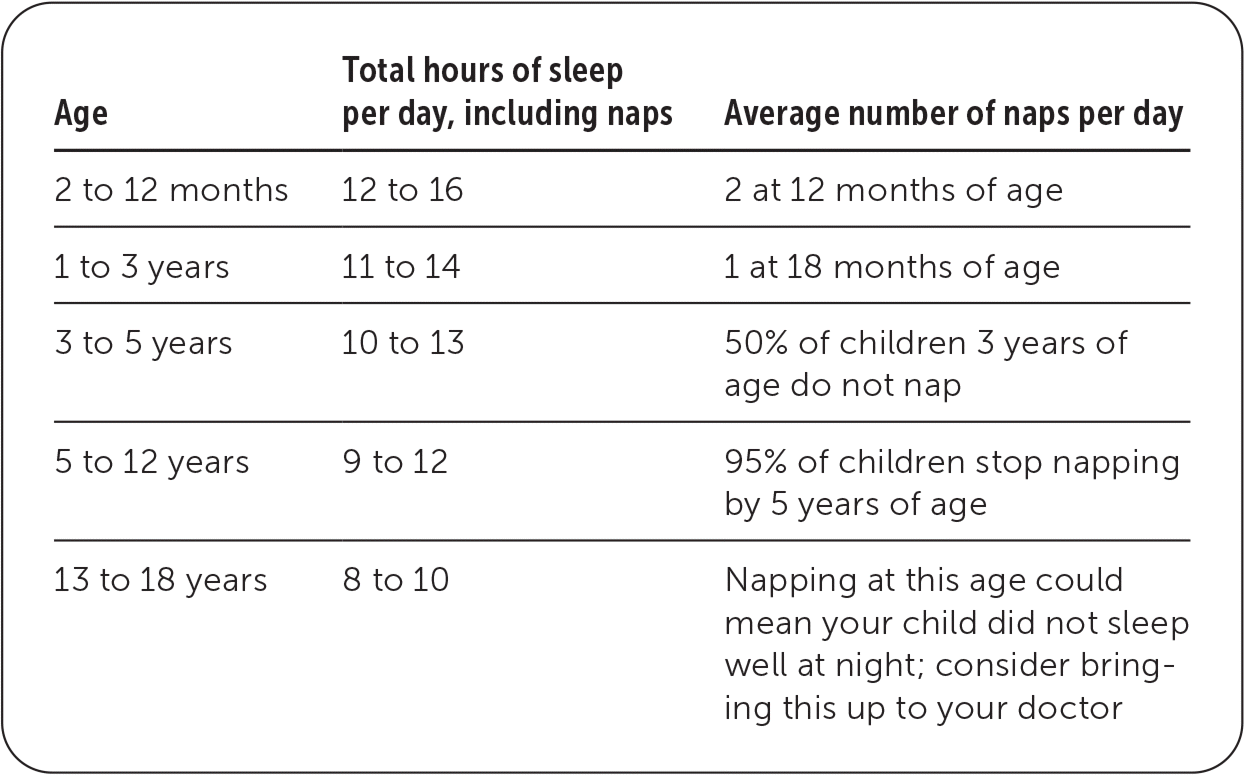
Am Fam Physician. 2022;105(2):online
Related article: Common Sleep Disorders in Children
Why is it important to treat sleep problems?
Sleep is important so your child can grow healthy and happy. Six out of 10 children in middle school and seven out of 10 in high school do not get the amount of sleep they need.
Without adequate sleep, children can have a hard time focusing and become hyper or cranky. They can have behavior problems and not do well in school. They can get serious medical problems like high blood pressure, weight problems, obesity, diabetes, headaches, and depression. Sleep-deprived teenagers may be involved in car crashes. Good sleep habits can prevent these complications.
You can help your child stay healthy and sleep well by understanding their needs and providing good sleep training. Prevention is the best treatment of sleep problems in children.
How much sleep should my child get?
Your child's sleep needs change as they grow. Every child is different, so these are general recommendations by age.

| Age | Total hours of sleep per day, including naps | Average number of naps per day |
|---|---|---|
| 2 to 12 months | 12 to 16 | 2 at 12 months of age |
| 1 to 3 years | 11 to 14 | 1 at 18 months of age |
| 3 to 5 years | 10 to 13 | 50% of children 3 years of age do not nap |
| 5 to 12 years | 9 to 12 | 95% of children stop napping by 5 years of age |
| 13 to 18 years | 8 to 10 | Napping at this age could mean your child did not sleep well at night; consider bringing this up to your doctor |
What are good sleep habits for children?
Here are some tips for each age group. Your newborn baby does not have a schedule. They sleep up to 18 hours a day and wake up for feedings.
Tips for your newborn up to two months of age:
Put your baby in the crib when sleepy, but not asleep
Recognize when your newborn is sleepy (fussy, crying, rubbing eyes)
Expose your newborn to sounds and light during the day and dim the lights and sounds during the evening and night so they learn the difference between day and night
Infants should be put to bed on their back
Tips for your infant from three to 12 months of age:
By five to six months of age, infants learn to sleep through the night. Try to have a soothing bedtime routine and follow it regularly
Put your baby to bed when they start getting sleepy so they can learn to soothe themselves and fall asleep
Do not overfeed your baby or put them to bed with a bottle in their mouth
If your baby wakes up during the night, keep the feeding brief; do not turn on bright lights or entertain the baby; return the baby to bed once burped and relaxed
Your baby should be put to bed on their back
Infants younger than 12 months should be put to bed alone because sleeping with them may increase the risk of SIDS (sudden infant death syndrome)
By about nine months of age, infants can sleep through the night without the need for feeding
Tips for your toddler from one to three years of age:
Try having a pleasant bedtime routine and maintain the same wake-up time; bedtime routine can include taking a bath, changing into pajamas, and reading a book
Limit electronic media or television exposure
Keep the sleeping area cool, quiet, and dark
Your child may have a light snack before bedtime if hungry, but avoid too much fluid
Avoid vigorous activity before bedtime
Help your child learn to fall asleep alone; if your child wakes up during the night, help them return to bed calmly and let them fall asleep; compliment your child when they stay in bed and fall asleep on their own
Tips for your school-age child:
Maintain a pleasant bedtime and wake up routine; try to have consistency on weekdays and weekends
Avoid electronic media or television before bedtime
Keep the sleeping area cool, quiet, and dark
Do not give caffeinated beverages or food several hours before bedtime
Avoid vigorous activity before bedtime
Tips for your teen:
Encourage a consistent bedtime and wake-up time on weekdays and weekends
Discourage bright and blue light exposure (electronic devices) before bedtime
Teens need more sleep than usual, not less
If your child is having problems falling asleep, staying asleep, has snoring, sleepwalking, or daytime problems like being cranky or hyper, talk to your child's doctor.
Where can I get more information?
Your doctor
AAFP's Patient Information Resource
Healthychildren.org
U.S. National Library of Medicine—MedlinePlus
